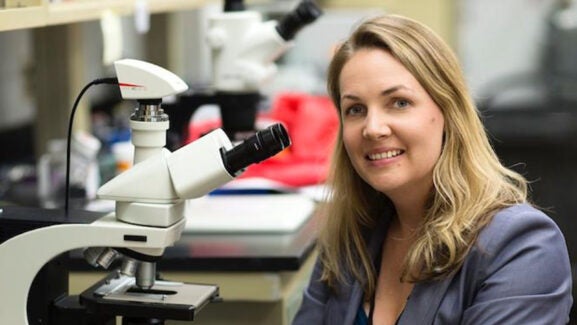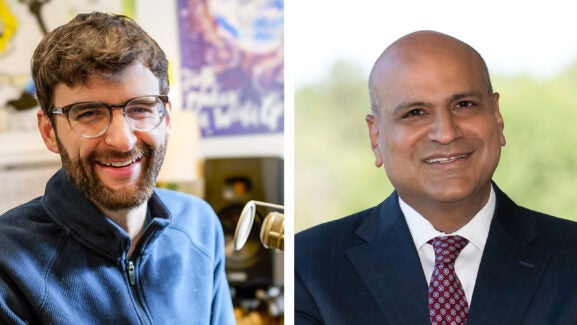
5 Quick Questions: How Soon Can We Get Back to Normal?
As Medical Director of Employee Health, Josh Eby, MD, explains, emerging from the restrictions of the COVID-19 pandemic will occur in steps, some of which are happening now. Returning to normal will depend on vaccination rates and continues to be a race against time.
What restrictions are being lifted after a team member gets fully vaccinated for COVID-19?
Dr. Eby: It takes two weeks after a team member receives their final dose of vaccine to gain maximum protection from COVID-19. At that point, a number of restrictions begin to change:
- At Work — While masking is still mandatory at all times in UVA Health facilities, the following testing and quarantining requirements have changed for fully vaccinated team members:
- You can travel in the US and not need to quarantine or test before you come back to work.
- You can travel internationally and not need to quarantine when you come back. However, you still need to get tested for COVID-19.
- If you are exposed to COVID at work, you do not need to quarantine at work or home. However, you may still need to get a COVID-19 test.
- Outside of Work — You can follow CDC guidance for mask wearing. However, there are several reasons to continue to take precautions indoors:
- You never know if others around you are truly vaccinated.
- Vaccines may not fully protect certain people, such as those who are immunosuppressed.
- Vaccines may not protect as well against the pervasive variants of the virus.
Why do fully vaccinated team members still need to be tested for COVID-19 at all?
Dr. Eby: Getting vaccinated greatly reduces the risk of becoming severely ill or dying from COVID-19. However, fully vaccinated team members can still get infected and unknowingly transmit covid to others. For that reason, getting tested after potential exposures during travel and at work helps keep others around you safe.
Getting tested also serves the public good. It provides data that can be useful to public health agencies. For example, test data may show that vaccinated people get infected with a certain variant of the virus, and this can indicate the need to adjust masking and testing policies.
Will COVID-19 eventually go away?
Dr. Eby: We are not sure if vaccines will totally eradicate COVID-19. However, we expect that vaccinating enough people will cut the transmission and death rates so low that the disease will not affect our everyday lives.
A good example of what I’m talking about is whooping cough. Before a vaccine became available, whooping cough outbreaks occurred every couple of years and took the lives of children. The vaccine has not completely eradicated the disease, but it has decreased transmission and prevented people from dying. Because we have administered the whooping cough vaccine to all children, society is able to live normally in the presence of the disease. Occasionally, cases of whooping cough are reported, but we do not live every day taking precautions against it. Extending this analogy, although COVID-19 may never go away completely, having enough people fully vaccinated will let us all live normal lives.
Will we ever return to normal?
Dr. Eby: We will get back to normal when enough people are vaccinated to make viral transmission unsustainable. You are probably wondering how many people that will be, and no one has an exact answer yet. What we do know is that current vaccination levels will not stop the potentially deadly transmission of COVID-19. Simply put, we need to get more people vaccinated to end transmission.
I’d like to remind everyone who is still undecided about getting vaccinated that rolling up your sleeve will not only help society return to normal, but also provide important personal benefits. When you are fully vaccinated:
- You are protected from getting sick and dying from COVID-19.
- Your risk of getting the virus from someone else is substantially reduced. (How much your risk is reduced is under study.)
- If you do get infected with the virus, you are less likely to transmit the virus to others. (How much virus transmission is reduced is also under study.)
Why is getting back to normal a race against time?
Dr. Eby: As long as the COVID-19 virus has access to unvaccinated hosts, it will continue to circulate in society. The longer people wait to get vaccinated, the more time COVID-19 transmission continues in the population, and the more chance there is for the virus to mutate and get worse. These mutant strains, or variants, are now expanding, killing more people and transmitting faster.
Some people are deciding not to get vaccinated because they think of themselves as strong and not likely to get severely ill. However, they can still get infected and actively carry the virus to others, continuing transmission. The sooner everyone is vaccinated, the sooner we break the human chain of transmission and stop these variants. Hopefully, we can do that before the variants mutate enough to fully escape the effects of the vaccine.
Latest News




when will UVA employees expect a booster given we were vaccinated in December 2020 and January 2021?
thank you
Thanks for the comment, Robin. We contacted Dr. Eby and he says, “The need for a booster is not defined yet. No additional doses are currently recommended.”